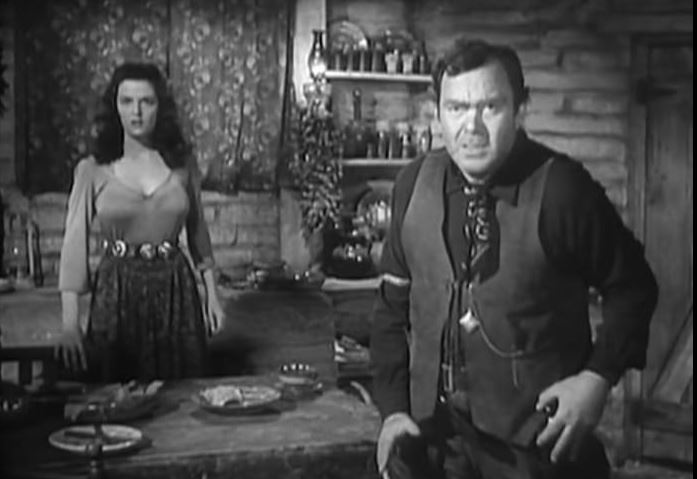
Over 80 years after its release, perhaps the best-known thing about Howard Hughes’s The Outlaw is still the controversy over how much (or how little, by today’s standards) of Jane Russell’s breasts are on display. Hughes was forced by the Hollywood Production Code Administration to remove about 30 seconds of offending footage, but even after the cuts 20th Century Fox rescinded their agreement to release the film, which led Hughes to employ a bit of ingenious reverse psychology. Through calls to ministers, women’s clubs and housewives, he created a public outcry for the film to be banned for its supposedly lewd content, which in turn led to an opposing demand for the film to be shown, drumming up quite a lot of publicity at little cost. The old urine-collector was still pretty sharp in those days.
Though it’s really just a bit of cleavage and Russell’s character is mostly just a bargaining chip throughout (at one point she is literally traded for a horse; more on that later), The Outlaw is far ahead of its time in many ways, not least of which is the fact that, decades before Brokeback Mountain or The Power of the Dog, it proved that Hollywood was making gay cowboy movies that didn’t star Rock Hudson. At its heart, this is a classic love triangle between three men: Pat Garrett (Thomas Mitchell), Doc Holliday (Walter Huston), and Billy the Kid (Jack Beutel).
In the beginning of the movie,Garrett practically does a jig when informed that Doc is back in town, his eyes lighting up as he proclaims, “He’s my best friend. As long as I’m sheriff around here, the place is his.” The rapport between the two is extremely loving, with Doc tenderly embracing Garrett and pinching his cheeks: “You wintered kinda fat, didn’t you?”
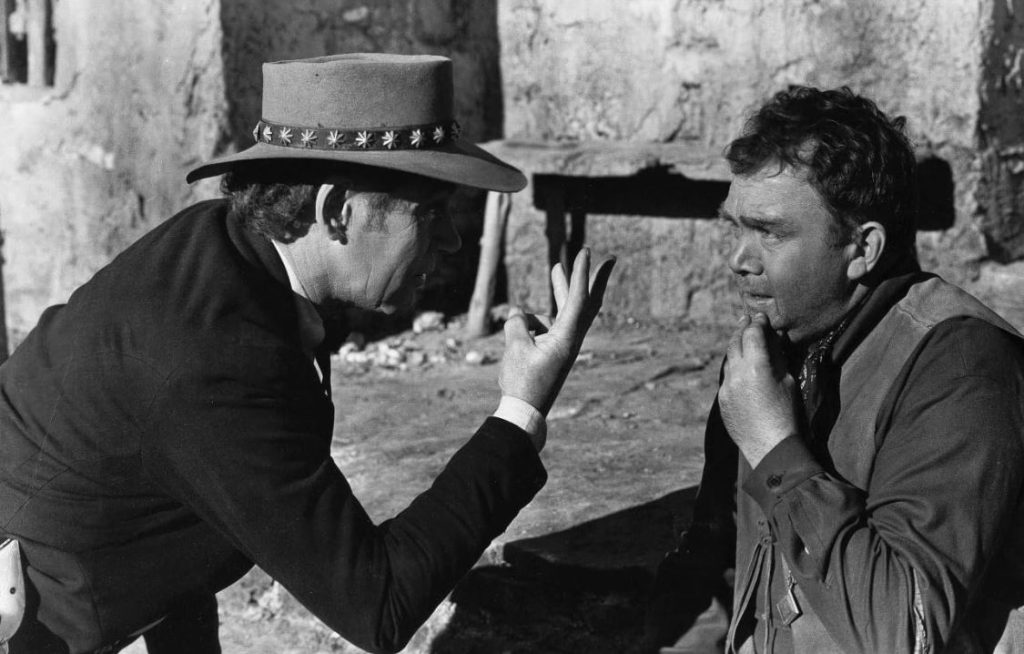
The reunion is soured by Garrett’s revelation that he’s become a lawman. It plays out like the betrayal of marrying a woman, thereby ending all the good times these boys have had together over the years. “You’re the last man I ever thought would be so easily satisfied,” Doc says glumly, to which Garrett replies, “Well, a man’s gotta settle down sometime.”
I never realized the extent to which my idea of Doc Holliday had been shaped by Val Kilmer’s iconic performance in Tombstone until witnessing Huston’s vastly different take on the character here; he plays Doc as a rather goofy comic relief figure. The whole tone of this movie is wildly different from that of the hyper-violent Tombstone, though, much more akin to the screwball romantic comedies of uncredited co-director Howard Hawks, full of swelling strings in the romantic moments and muted trumpets going WA-WA-WAAAHHH for the comical ones.
Doc and Billy meet cute with a coy exchange about Doc’s stolen horse, Red. “I don’t want to take advantage of you,” Doc says, looking the young stud up and down approvingly. “Thanks,” Billy replies. “For a while I thought it’d be the other way around.” He’s a switch, young Billy is! There is a mutual antagonistic admiration between the two that creates a delicious tension, and they almost draw down and shoot their loads at each other right then and there before being interrupted by Garrett, who quickly underestimates Billy, both as an adversary and as a threat to his long-standing relationship with Doc.
After cold-cocking Garrett before the older man can do the same to him, Billy rides away on Doc’s horse, thereby establishing his dominance over the two old queens. Doc is enticed by the younger man and goes to visit him soon after. They bond over their shared love of Red, the stolen horse, and the tone and score (those swelling strings!) are exactly the same as in romantic scenes between men and women from this same era, including later in this same film. Doc fondles the gloves sticking out of Billy’s belt suggestively before luring him into the trap he and Garrett have set, and Garrett takes Billy from behind.
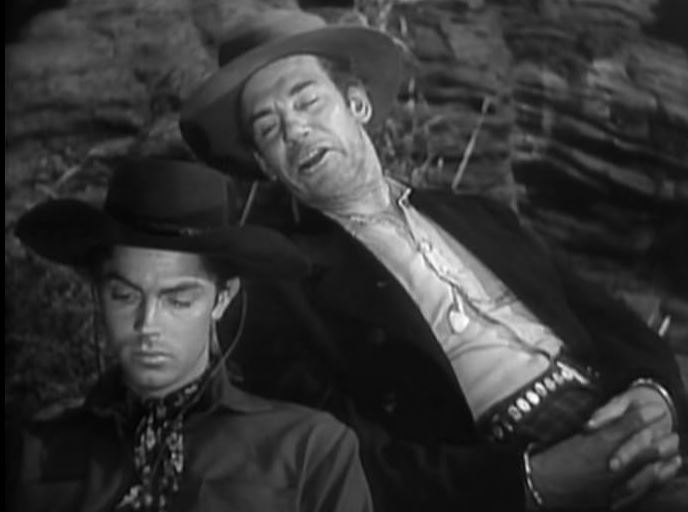
Alliances shift forever in this moment, as Billy sneers, “The great Doc Holliday getting someone else to help him, and a policeman at that,” negging Doc quite effectively and making him desire Billy’s approval. He leads the older man outside and flirtatiously steals his tobacco pouch from his front shirt pocket, a move that will be lovingly repeated throughout the movie. “I want the two of you out of this town by sundown,” barks the jilted former lover, Garrett; then, almost tearfully, “That’s all right, Doc. You’ve got the right to choose your friends.”
“Doc, if you’re not already fixed up, you can bunk with me tonight,” Billy says hopefully as those romantic strings swell again, but Doc claims to have a girl, and inquires after Billy’s own beard status. “I don’t trust them,” Billy says, and Doc takes his leave, but not before an aborted attempt to steal Red back for himself. Billy bunks down in the stable, ostensibly to prevent any further attempts at theft but more likely hoping his new lover will return in the night for other reasons.
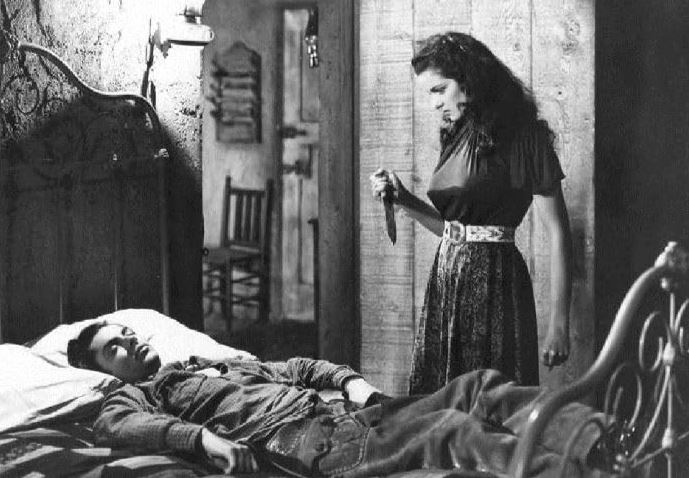
Billy is stalked and attacked in the night by Woman in the form of Rio McDonald (Russell), portrayed at first as a mysterious, almost feral creature, certainly not to be trusted, as Billy has already elucidated. Their first “love” scene in the barn is entirely in shadow, with shouts of “Let me go!” and the sounds of tearing fabric, and Billy’s calm assurance that if she doesn’t hold still, she “won’t have much dress left.” Sex between men and women is a mystery enshrouded in darkness, but the one sure thing is that it’s a forceful act of ownership; tenderness is reserved for one’s fellow man.
Doc returns from evading Garrett to find Rio (“his girl”) and Billy married, which Billy equates with Doc’s theft of Red while Billy was unconscious. Of course, as Doc points out, the horse was also his in the first place, and so the trade begins. To the tune of the whimsical score that accompanies their most flirtatious moments throughout, Billy proposes a reconciliation: “Just to show you my heart’s in the right place, I’ll let you take your pick.”
“You mean you’d trade me for a horse?” Rio demands indignantly, to which Billy calmly replies, “It’s up to Doc.” Cue the muted trumpet WA-WAHs! Doc chooses the horse, much to Billy’s overt disappointment, and Rio tearfully exits, much to his confusion. What could possibly be eating this bargaining chip with tits? He pays her off with $40 (copped from Doc) and the two of them head off to Brokeback Mountain together.
Rio has her revenge by sending fellow jilted lover Garrett on the trail of the new couple. Billy leaves in the night to confront her over her betrayal and Pat captures the sleeping Doc. “Where’s Billy?” Doc asks with alarm, and Garrett sneers, “Looks like he left you” before tossing Doc a pair of handcuffs, the symbolic wedding band that will recommit Doc to himself.
Billy may be bisexual, as he has an undeniably charged scene with Rio when she defies him, almost daring him to kill her. “I like to hear you ask for it…. Beg some more. Will you keep your eyes open? Will you look right at me while I do it?” Pretty much hardcore porno dialogue right there, and then he ties her up BDSM-style and leaves her where the two old queens can find her.
Garrett devises a scheme to capture Billy when he comes back for Rio, but has he really deluded even himself into believing this? Doc is clearly the one Billy wants, as he confirms when he does return. Captured together, Doc and Billy once again argue about who wants Rio less while she stands by and listens.
“You want it now?” Garrett asks Billy after he and Doc have a brief scuffle, meaning to pull his big gun and “plug” the Kid. “I’ve just been waiting for an excuse to give it to you.” Then, when the obligatory Injuns attack, Garrett pulls a power daddy move and insists on riding Red, asserting his dominance over both of the men who’ve left him jilted. He is, however, forced to temporarily return their guns to them and, after they all escape to safety, Doc and Billy are reluctant to be unmanned again, once more asserting their alliance against Garrett.
Unable to consummate their relationship in a sexual way, Doc and Billy come to the point of a quick-draw over Red, ever the symbol of their forbidden desires. Doc gives a heartfelt speech about how boys in the schoolyard fight in fun until “somebody always gets hurt,” and it melts Billy’s heart to the point where he won’t draw. Garrett is quick to say that Billy lost his nerve, that he’s just a showoff, but he knows as well as Doc that it’s true love he is witnessing. Doc then mutilates Billy’s hand and ears with grazing gunshots in a ritual sublimation of his true desires.
“What’s the matter with you?” Doc shouts. “I wouldn’t think you’d take this off anybody!”
“Maybe I wouldn’t off anyone else,” Billy replies. “You’re the only partner I ever had.”
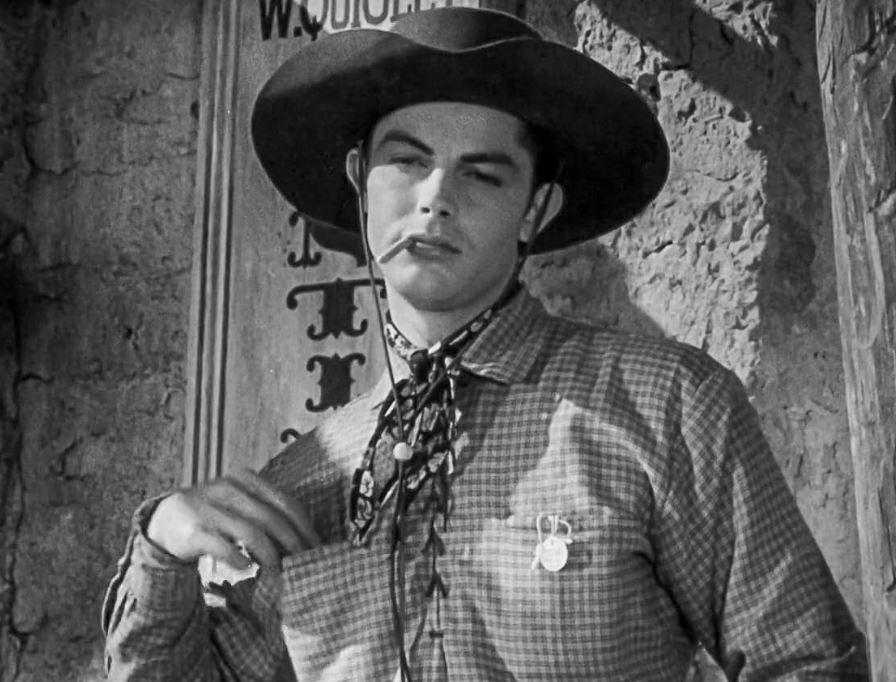
After this final spat, the two return to their former loving gestures—hands on shoulders, delicately stealing the tobacco pouch—and my god, the swelling strings! Rio the fag-hag looks on, smiling with approval at the reconciliation, but old jilted Garrett is furious when Doc declares that he and the Kid will never fight again. “Ever since you met him you’ve treated me like a dog,” he shouts. “The oldest and best friend you ever had, and I still could be, if it wasn’t for him!”
Ultimately, in allowing himself to be gunned down by Garrett and insisting Billy not retaliate, Doc shows he does still love the older man as well. “You had me cold!” Garrett cries. “Maybe I don’t like cold meat, Pat.” That’s right, Doc’s final words are about his old friend’s meat, folks.
Billy and Garrett are left to deal with each other, the two corners of the love triangle now deprived of the peak on which they both had focused. “It sure is funny how two or three trails can cross and get all tangled up,” Garrett observes over Doc’s grave. Notably missing from this equation is Rio, who is overjoyed to ride off into the sunset with Billy despite the certain knowledge that this happy ending is as fake as Billy’s own tombstone, with which the final shot is juxtaposed. His heart will forever be with Doc, and the love they could never share.
Leave a Reply